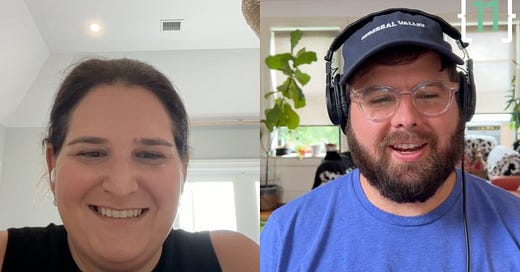Union Square Ventures has some of the best performing funds in the venture capital industry.
As I’ve reported, USV-backer UTIMCO disclosed in a recent filing that USV had delivered the public investment fund an internal rate of return of 59%. And that number will likely go up over time. (For instance, USV portfolio company Casetext sold to Thomson Reuters for $650 million after the UTIMCO performance update.)
I invited USV managing partner Rebecca Kaden onto the Newcomer podcast to talk about how USV consistently invests in unconventional companies.
We started off our conversation talking about Journey Clinical, the psychedelics company, in which Kaden announced a Series A investment in January.
We also discussed USV’s $200 million climate fund strategy, her interest in the AI application layer, and how rising interest rates are effecting the venture capital asset class.
Give it a listen
Highlighted Excerpts
The transcript has been edited for clarity.
Eric: How do you repeatedly invest in weird things like psychedelics?
Rebecca: This thesis around access to care, which has attracted so much capital — some of it ours and is proving to be a good category — has been where the market has gone, but it’s actually only one piece of the puzzle. The way we get into things that are unusual is by having strong theses about where things are going versus being extremely opportunistic. Obviously, there’s a balance. But that thesis thinking is important. A lot of thesis work on this category really led to the belief that access to care is only half the puzzle. The other is how is care itself going to evolve, and you start unraveling that thread: how is care itself evolving? The real biggest last evolution of care is SSRIs. Those are prescription drugs and have been very important to the treatment for mental health crises, but there’s a lot of things they don’t treat. They’re not a one size fits all model. And they’re basically all we got, right? The innovation has not had a lot of other layers, except for psychedelics. And so we became very interested in psychedelics as the next card to get turned over and the next option in needing a bucket of options to treat a crisis.
Eric: There are pharmaceutical companies. If there’s money to be made, shouldn’t they be trying? What’s happening that it feels like you need a real outsider thinking to bring ketamine, a drug that’s legal, to people’s lives that the medical system is unable or unwilling to do what’s happening?
Rebecca: Well, this isn’t really unique to psychedelics or to mental health. Pharmaceutical companies make drugs, so the development of drugs goes with them, but the distribution and networks of access is outside of it. That’s not particularly new or unique here. That’s where business opportunity has been. So the idea is, when you talk about distribution and networks of access, that’s often where these business opportunities lie. The development of drugs is kind of a different beast, which lies in the pharmaceuticals. Why is there a business opportunity with creating access? Because the same reason technology drives business opportunity into anything. Offline access is slower, it’s more gated; it’s more piecemeal. You have to be at the right doctor at the right time, you have to find it. By creating a network, you just allow anyone anywhere to find access and education at a faster speed and with much broader supply, which brings efficiency to the market.
Eric: Do you think mushrooms are going to be on the table soon? Or how much was this a bet that the regulatory regime would change?
Rebecca: I don’t think mushrooms as we think about them in a recreational sense are just gonna get legalized, maybe they will, but that’s a separate kind of thing. I think other forms of psychedelics in formats that are right for care are very much going to get legalized. And actually, as we did our research, to us that’s a when not an if. When you dig into what’s going on clinical trials and in the clinical world, in some ways that seems pretty easy to bet on that these will continue to happen. And if not exactly the form that we’ve outlined, rapid new forms of options for care for mental health diseases are going to get approved and released. They’re going to need a network of education and distribution to go into the therapist network.
I do think there’s a regulatory risk here. There’s some amount of regulatory risk on psychedelics. We have to be honest about it. But I actually think more about regulatory risk across broader online healthcare in general. We’re at somewhat of a time of that whole market still getting worked out on not unique to mental health and not unique to psychedelics, but what you can prescribe online and to whom and to how and how to allow that really important access that we’ve come to rely on, but also do it in an appropriately controlled way.
Eric: You come from a consumer focused firm. When you were interviewing with USV, was it clear that you were shifting away from consumer, and how have you thought about consumer professionally?
Rebecca: We don’t think a lot about the divide in our portfolio if we think about our fund construction, or how we're looking at the world between consumer and B2B. What we think about is this thesis and the mechanics involved, for instance the role of building network driven businesses and the opportunity to leverage bottom up networks to create moats and scale and to broaden access by driving value and down costs systematically across categories we care about. Sometimes the right application when you pull the threads of that thesis is a consumer product or service, and sometimes it’s the enabling infrastructure of them. But most of USV’s investments had been one of those two things. They’ve either been the end application or the enabling infrastructure involved, but a common theme throughout our investments is how do you build important networks that can change industries, but rise outside of them. If you think about Journey Clinical, it’s a network of therapists. They’re stronger, and the more you add on to them, it’s a bottom up growing network of acquiring the therapist, even though it interacts with the healthcare system and can change it. But it’s growing this network outside of the infrastructure to then impact the existing structure. We really like that if you think across of our investments, and sometimes that turns out to be consumer, if you think about an Outschool in education, or a Duolingo, or a Twitter, and sometimes it turns out to be the enabling infrastructure or the B2B Marketplace application like Journey Clinical.
Eric: What are your thoughts on AI in consumer?
Rebecca: The piece of the AI craziness that I’m most excited about is the application layer. There’s still a lot of kind of complexity and uncertainty on the foundational model and on the enabling infrastructure on where equity value aggregates — how much of the stack the models own, how defensible those models are, how that shakes out — but what I feel like we can have more conviction about is that it unleashes a wave of consumer innovation that’s going to be really fun. The way this is gonna get utilized is by products that we want to use. I’m excited about unleashing this rejuvenated value around fun things to do, where the coolest thing about AI driven applications is they get better if people actually use them. So the strongest incentive of the team is to increase engagement and utility. The only way to do that is to combine utility with fun. There’s gonna be so many things in the market that if things aren’t fun to use, you’ll go to another option. But the team has a huge incentive to get you to stick because that’s how their product gets better. So if you think about something like Duolingo, which has been on this for a long time of leveraging machine learning and AI to create better consumer experiences — streaks, gamification, fun — infused with the utility of language learning is critical, because their product gets better if I use it. I’m really excited to see that apply to lots of different consumer applications. We’ve been talking a lot and everyone’s been talking a lot about whether they’re going to be moats. Is stickiness going to be possible? The barriers are so low. The moat is going to be fun and teams that can create rapid new fun things that keep you on the platform. We haven’t seen that in a while. I’m excited about it.















Share this post